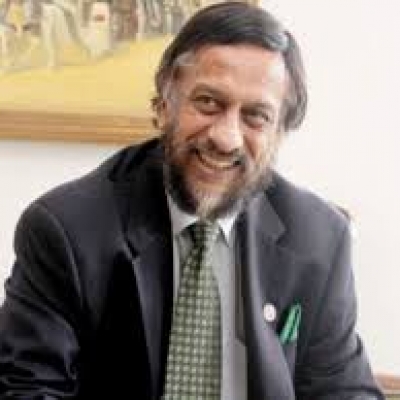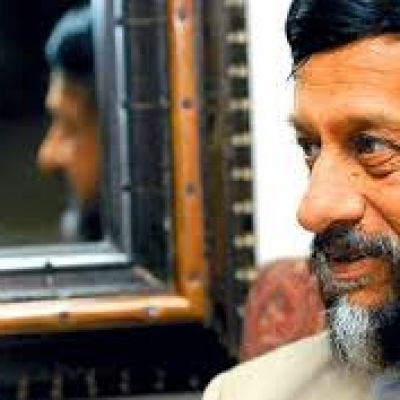
ASCI
Dr. Pachauri joined the Administrative Staff College of India (ASCI) in Hyderabad in June 1975. ASCI was established in 1956 at the initiative of the government and the corporate sector; it focused on post-experience management education in India. The institution functioned to build capacity and equip corporate managers, administrators, entrepreneurs and academicians with the skills to synthesize managerial theory and practice considering the changing environment. The professional work at ASCI influenced Dr. Pachauri as he would continue to emphasize on the importance of theory, practice and upgrading of skills even later in his leadership roles.
Dr. Pachauri’s first major contribution to energy policy in India was when towards the end of 1977, the Planning Commission of the Government of India decided to set up a Working Group on Energy Policy to draft a roadmap on India's energy policy; this was after India was battered with a quadrupling of international oil prices in 1973–74. Dr. Pachauri became a member of that Working Group and contributed in a modest way to India’s energy policy.
His work at ASCI also brought him to develop a close relationship with Dr. Vijay Kelkar who was extensively working with the government of India in Delhi. Dr. Pachauri and Dr. Kelkar discussed how the then Prime Minister would need professional advice to take India into the 21st century. Together, they decided to set up a small think tank to help the Prime Minister and the government with policy analysis and advice; with this proposal, they wrote to the Prime Minister’s Office (PMO). The PMO conveyed the Prime Minister's agreement to set up the proposed think tank. Together with Dr. Kelkar, Dr. Pachauri established a small organization called the 21st Century Foundation, which functioned for three years. Dr. Pachauri with some colleagues collectively drew up policy papers on a number of subjects ranging from energy policy to health care and submitted them to the PMO on a regular basis; surprisingly, each one of them received attention in the PMO and various ministries and departments of the government of India. Dr. Pachauri was buoyed with a heady sense of optimism and hope; he was overtaken by a fervent belief that India was finally on the verge of greatness. In Dr. Pachauri’s own words, “we were touching the edge of a rainbow”. This experience also made Dr. Pachauri realize the need and importance of an institution in India which could undertake research on matters such as energy and environment and also provide solutions in terms of technology and policy advice. This experience was important in laying grounds for Dr. Pachauri’s work in building TERI later on.
Related Links:
Prime Minister’s Address at ASCI Golden Jubilee Event mentioning Dr. Pachauri’s and ASCI
Article on corporate financial management authored by Dr. Pachauri published in the ASCI Journal of Management
Gallery:
Dr. Pachauri’s first major contribution to energy policy in India was when towards the end of 1977, the Planning Commission of the Government of India decided to set up a Working Group on Energy Policy to draft a roadmap on India's energy policy; this was after India was battered with a quadrupling of international oil prices in 1973–74. Dr. Pachauri became a member of that Working Group and contributed in a modest way to India’s energy policy.
His work at ASCI also brought him to develop a close relationship with Dr. Vijay Kelkar who was extensively working with the government of India in Delhi. Dr. Pachauri and Dr. Kelkar discussed how the then Prime Minister would need professional advice to take India into the 21st century. Together, they decided to set up a small think tank to help the Prime Minister and the government with policy analysis and advice; with this proposal, they wrote to the Prime Minister’s Office (PMO). The PMO conveyed the Prime Minister's agreement to set up the proposed think tank. Together with Dr. Kelkar, Dr. Pachauri established a small organization called the 21st Century Foundation, which functioned for three years. Dr. Pachauri with some colleagues collectively drew up policy papers on a number of subjects ranging from energy policy to health care and submitted them to the PMO on a regular basis; surprisingly, each one of them received attention in the PMO and various ministries and departments of the government of India. Dr. Pachauri was buoyed with a heady sense of optimism and hope; he was overtaken by a fervent belief that India was finally on the verge of greatness. In Dr. Pachauri’s own words, “we were touching the edge of a rainbow”. This experience also made Dr. Pachauri realize the need and importance of an institution in India which could undertake research on matters such as energy and environment and also provide solutions in terms of technology and policy advice. This experience was important in laying grounds for Dr. Pachauri’s work in building TERI later on.
Related Links:
Prime Minister’s Address at ASCI Golden Jubilee Event mentioning Dr. Pachauri’s and ASCI
Article on corporate financial management authored by Dr. Pachauri published in the ASCI Journal of Management
Gallery:

